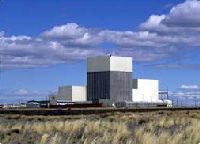Newly finalised plans to transfer US Department of Energy (DoE) depleted uranium into the civil nuclear fuel cycle for re-enrichment will see the Paducah enrichment plant continue to operate for an extra year and secure long-term nuclear fuel supplies for two US utilities.
 |
| Columbia: fuel guaranteed to 2028 (Image: Energy Northwest) |
DoE's plan, developed in collaboration with Energy Northwest, the Tennessee Valley Authority (TVA) and Paducah operator USEC, will see a portion of DoE's high-assay depleted uranium tails transferred to Energy Northwest. The uranium will be re-enriched at Paducah under commercial contracts between the utility and USEC. Energy Northwest will use the resulting low-enriched uranium to fuel its Columbia Generating Station and will also transfer some of the low-enriched uranium to TVA.
Days before DoE's announcement, the executive board of Energy Northwest had approved its end of the deal subject to TVA's board also giving its approval. Energy Northwest CEO Mark Reddeman said the deal would provide a stable fuel supply at a lower cost, and be a "substantial benefit" to its ratepayers. The utility already has enough fuel in inventory or under contract to meet its needs until 2019, but the agreement provides fuel price certainty for the Columbia plant to 2028 including savings of about $20 million per year for its ratepayers. The 1190 MWe boiling water reactor is currently licensed to operate until 2023, but is expected to receive a licence renewal later this year that will extend its operations to 2043.
In December 2011 USEC had notified the DoE that a lack of commercial business meant it would have to consider ceasing enrichment activities at Paducah from May 2012. According to the DoE, an "abrupt loss" of Paducah's enrichment capability would have been detrimental both to its nuclear security and environmental cleanup operations. The department has therefore been working since January with the parties involved (USEC, Energy Northwest and the Bonneville Power Administration (sole customer for output from Columbia), and TVA) in an effort to ensure the plant could continue operations - and defer the start of decommissioning - for one more year.
The general framework for the project will see the transfer by DoE of 9075 tU of high-assay depleted uranium tails currently stored at Paducah - less than 15% of DoE's total inventory of high-assay tails - to Energy Northwest. Energy Northwest will then contract with USEC for enrichment services which will create 482 tU of low-enriched uranium. Energy Northwest will sell 435 tU of that to TVA over a period of several years starting from 2015. Gaseous diffusion is highly energy intensive, and the DoE notes that as part of the arrangement USEC has reached an agreement with TVA for a continued supply of power to the Paducah plant.
The DoE commissioned market consultant Energy Resources International (ERI) to analyse the likely effects of the depleted uranium transfer on the domestic uranium market. Based on ERI's findings, the DoE concluded that the transfers would have no adverse material impact on domestic uranium industries.
The uranium supplied to the TVA will be used to generate electricity but will also be used to produce tritium used in the maintenance of the USA's nuclear deterrent under contracts with the National Nuclear Security Administration (NNSA).
Paducah is the only gaseous diffusion enrichment plant still in operation in the USA. USEC is in the process of developing its new American Centrifuge Plant (ACP), and it had been envisaged that the new plant would be on line by the time Paducah closed down. Problems with securing federal loan guarantees for the new plant have slowed the project almost to a standstill, and a closure of Paducah would have left the USA without a domestically owned enrichment capability. Urenco USA's gas centrifuge enrichment plant in New Mexico was given the go-ahead for commercial operation in 2010 and its first phase is ramping up towards its capacity of 3.3 million SWU per year by 2013.
NYSE warning
The news of Paducah's reprieve came as the New York Stock Exchange (NYSE) issued USEC with a warning after its stock price fell below the minimum allowed level.
The NYSE requires the average closing price of a listed company's common stock to be at least $1.00 per share over a consecutive 30-day trading period. USEC's common stock price has fallen below this minimum, and the NYSE issued the company a continued listings standard notice giving USEC six months to regain compliance with its price criteria or face being delisted.
USEC says it is evaluating its options on regaining compliance, including a possible reverse stock split - a reduction the total number of USEC shares resulting in a proportionate increase in the share price. Such a move would require the approval of USEC's shareholders. Earlier in May USEC reported quarterly figures showing a loss of $28.8 million, equating to 24 cents per share, significantly higher than the $16.6 million loss for the same period in 2011.
Researched and written
by World Nuclear News




_19544_40999.jpg)


_66668.jpg)





